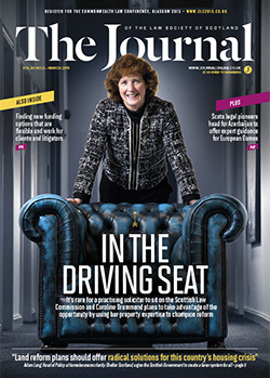Ready to go to court?

Witness familiarisation is new in Scotland, but has become an accepted feature of the legal landscape in England & Wales over the last 15 years for those preparing to give evidence in a wide range of legal hearings.
High-profile litigants have taken advantage of it, including Roman Abramovich in 2011 when he successfully defended a claim for more than £3.5 billion by his former business partner, Boris Berezovsky.
To quell any fear that the process is somehow improper, witness familiarisation must, at the outset, be distinguished from coaching. The latter is strictly prohibited; the former is “to be welcomed”, according to the Bar Council professional standards committee’s Guidance on Witness Preparation.
David Burnside, consultant at Scottish solicitors Burness Paull and adviser with provider firm Bond Solon, explains the process.
“It allows people who are naturally apprehensive about going to court or tribunals to have an explanation about the whole process, formalities and terminology.
“Additionally, it allows them to take part in a mock hearing where they are cross-examined to test their ability to stand up to what can sometimes be vigorous cross-examination in court.”
Importantly, he stresses: “The witness advisers, who are solicitors or barristers, must be unconnected with the case, have no knowledge of the matter in which the witness is involved and are not allowed to discuss their actual case.” Indeed, advisers must sign a declaration confirming that they have not done so.
Essential safeguards
Due to the novelty of the concept, neither the Faculty of Advocates nor the Law Society of Scotland provides guidance on the issue. But the Bar Council in England & Wales considered it following R v Momodou [2005] EWCA Crim 177, where Lord Justice Judge highlighted the “drastic distinction” between witness coaching and witness familiarisation.
“Witnesses should not be disadvantaged by ignorance of the process, nor when they come to give evidence, taken by surprise at the way it works,” he said.
“The process may improve the manner in which the witness gives evidence by, for example, reducing the nervous tension arising from inexperience of the process. Nevertheless the evidence remains the witness’s own uncontaminated evidence.”
The Bar Council’s guidance sets out stringent requirements to ensure that preparation is confined to helping witnesses give their best evidence without coaching. It says: “Great care must be taken not to do or say anything which could be interpreted as suggesting what the witness should say, or how he or she should express himself.”
Lawyers, it continues, should only approve or take part in mock cross-examination if “its purpose is simply to give a witness greater familiarity with and confidence in the process of giving oral evidence” and there is “no risk that it might enable a witness to add a specious quality to his or her evidence”.
The guidance also demands that records are kept of those present at the sessions and the written materials used.
Positive experience
The process, says Burnside, has been used extensively by leading firms of solicitors worldwide and met with positive feedback from judges, where court time is saved by witnesses answering succinctly questions put to them.
“When we first started offering witness familiarisation, lawyers were sceptical,” comments Piers Lawson, managing director of Bond Solon. But, he adds, “Over the years we have seen a mindset change and acceptance that giving evidence is a daunting, unfamiliar and uncomfortable experience for witnesses.
“Today we are seeing both lawyers and their clients realising the importance of providing their witnesses with as much support as possible before they give evidence.”
Tricia Walker, partner at Burness Paull, explains: “We ensure that all our clients who are facing giving evidence in forthcoming litigation are provided with the necessary support to help prepare them for the hearing.
“Our clients have stated they are delighted such a service exists, and were relieved to have received structured preparation prior to the hearing and felt much more confident about giving evidence.”
Mrs Justice Gloucester, who presided over Abramovich’s trial, said at the end of the case: “There was a marked contrast between the manner in which Mr Berezovsky gave his evidence and that in which Mr Abramovich did so. Mr Abramovich gave careful and thoughtful answers, which were focused on the specific issues about which he was being questioned.
“He was meticulous in making sure that, despite the difficulties of the translation process… he understood the sense of the questions which were being put to him.”
She applauded “Mr Abramovich’s responsible approach to giving answers which he could honestly support”, adding: “Where he had relevant knowledge, he was able to give full and detailed answers; he took care to distinguish between his own knowledge, reconstructed assumptions and speculation.”
With such a positive endorsement of the difference that it makes, surely it can only be a matter of time before it catches on in Scotland too.
In this issue
- Structured settlements: worth a look?
- Unfairness defined
- Our digital afterlife
- Powers of attorney: full instructions?
- Writings redefined
- Reading for pleasure
- Opinion: Adam Lang
- Book reviews
- Profile
- President's column
- Roll up to register
- People on the move
- Tax plan's on track
- Lease of life
- No win, no fee: no problem?
- Ready to go to court?
- Taking on the expert
- Pensions: keep up with the shake-up
- Equity investment and law firm funding
- Entitled to rely
- See-through setups
- Copyright: defining the boundaries
- Tenancies: the shape of things to come?
- A career taking off
- The system is sound, but...
- Law reform roundup
- Obituary: Leslie Cumming
- From the Brussels office
- From the Clyde to the Caspian
- Some common misconceptions
- Ask Ash
- Mediation: new options
- ABS: time to accept the evidence
- It is OK to change your mind
- Sizing up the class of 2018






